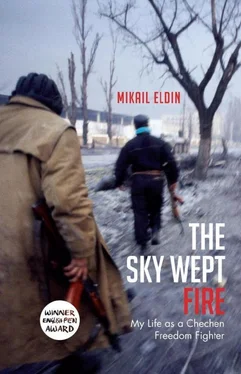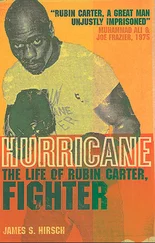In March, the command decides to withdraw you from the forest. Your small unit has been unable to take on political propaganda or tactical missions. When your unit was dispersing through the forest, there was one task you were to carry out urgently, should the need arise, and without waiting for orders. If the Russian troops in the village went on the rampage – killing civilians, stealing from their homes and so on – you were to break out of the encirclement immediately, join up with your brothers-in-arms who were still in the village and attack the enemy. Breaking out of the forest encirclement would have posed no problem: you could take out the checkpoint in the ravine in one minute flat. What’s more, lately you’ve become quite experienced at breaking out of encirclements and you’ve honed your skills. Had it happened, the enemy would have seen a fight to remember, yet you’d most likely have been killed to a man. But as the Chechen proverb goes, ‘The brave man throws caution to the wind when he’s doing battle.’
The enemy forces, though, have been particularly calm and quiet, and you’ve managed to avoid a hero’s death. And that means your unit currently has no mission to carry out in its present form. So the decision to withdraw from the encirclement makes sense. By now some of the resistance forces have disappeared to legalize, to varying degrees, their situation, while others are falling in the unequal battle against the enemy hordes in the village of Komsomolskoye. [48] The battle of Komsomolskoye took place in March 2000. The Chechens suffered heavier losses in this battle than in any other during the first and second wars.
By the rules of guerrilla warfare, you too ought to legalize yourselves – some of you partially, others completely. You’ve pulled out of the forest following the usual pattern: by passing the ravine checkpoint in twos and threes. The new village administration installed by the Russians is doing everything it can to save your skins: they help you escape from the district to a place where, so long as nobody talks, you can safely get your passports registered. [49] In the Russian Federation, all citizens were required to have internal passports officially recording their place of residence. Any Chechen caught without the right stamps in his passport would immediately arouse suspicion. Legalization was essential for freedom of movement, as the Chechens could be asked for their ID in random swoops or at checkpoints.
Those who are carrying their passports get help from the village administration to register them. And for those who don’t have one, they issue refugee certificates. Indeed, the Russian police themselves know perfectly well who they’re dealing with: one said as much when you were registering as a refugee. He said they’d simply rather not ‘have somebody’s soul on their conscience. No matter who that man might be.’ These were ordinary policemen who hadn’t been through the Russian propaganda mill. You all make it out of the forest encirclement without losses. For a few weeks you live with relatives in the same village and quietly go out of your mind. It’s as if these people have drunk of some poisoned water and they’ve all gone mad together, like in one Sufi parable. They positively savour every detail of the deaths of your comrades drawn into the cul-de-sac of fire in Komsomolskoye. They are crying and grieving for the fallen youngsters, admiring their heroism and endurance, yet… You just cannot listen to the detailed descriptions of the deaths of men who only yesterday were sharing their last crust of bread with you. And you have nowhere to go and hide. There are many refugees; you are surrounded by people. And all of them, everywhere, are talking about this tragedy. But fortune saves you from sinking irrevocably into hatred for them. You manage to get a lift in a car going higher into the mountains, to a small village. There you find dozens in the same situation and you live there for many months. These villagers are tactful enough not to mention the tragedy in front of you and your comrades. They take care of you as best they can: warning you in time about ‘cleansing ops’, hiding you in their homes and feeding you. Not one resident of this little village, no adult or child, has informed on any of you to the enemy. Indeed, neither did any of the villagers near the forest camp where you were encircled for over a month. Quite the opposite: thanks to their help and efforts you all managed to break out alive and unwounded. Over the course of some months, you all gradually get yourselves legalized, later to rejoin your comrades.
Today is quite a momentous occasion. It is remarkable for two reasons. Firstly, I’m travelling to a temporary police station. On my own initiative. Voluntarily. Not, of course, to repent of my terrible sins and ask the occupying police for forgiveness – for amnesty, in other words. It’s just I need to go legal, and that requires registering my passport at the police station. According to certain sources, whom I’m inclined to trust, the police have put out an all-points warning for me – that is, I’m on the wanted list. So I’ve finally made myself an enemy. That was just what I’d hoped to avoid while living for several months in the small mountain village and fleeing into the forest every time a ‘cleansing op’ began. But today I’ve been informed that my friends on the other side of the barricades have managed to get me off the wanted list. And so I’m on my way to register. There are no guarantees that it will all go smoothly. My friends might even be drawing me into a trap. But I have to try. And so I’m going.
The second reason this day is notable is that for the first time after a long break (it’s been over ten months, since October last year) I am going out into the world. Well, this ‘world’ is actually just a small district centre, hidden in the highlands. Never mind that I’m wearing old, faded jeans that were once black, soft-soled canvas shoes donated to me by a kind-hearted mountain villager (wearing boots is out of the question – they’d arouse suspicion), and an extra-baggy denim sleeveless shirt over a T-shirt, a gift from a relative. But then there is life in that world. Proper life. Civilian life. Even if it’s surrounded by checkpoints and army units. You can buy things; there’s a real market. It may be small, but it’s real. And you can ask the traders who’ve travelled to the market about the situation in the capital and on the roads. Get news straight from the horse’s mouth. The information you obtain from official sources, with the help of a small transistor, has no claim whatsoever to truth. And so the only reliable news source left is word-of-mouth. I quickly obtain the coveted registration stamp in my passport before heading for the centre of the village. To get the stamp I have to endure several minutes of feeling horribly impotent. They lead me through the back door, bypassing the queue; an officer stares at me for a whole minute before smiling and saying, ‘OK, lad. You can live.’ Without a single question, not even a routine one, he stamps the passport.
The village centre, where the market is held, is the hub of social life. I approach some women traders who at a glance realize where I’ve come from and willingly provide me with the news I am after. Then a friend and I go to a kebab house and sit at an outdoor table. Soon we are joined by two soldiers and an officer, a major according to his shoulder straps. As our table is the only one with empty seats, they ask if they can sit there. Little by little we strike up a conversation. The officer is in the engineering corps and the contract soldiers are in the motorized infantry. When they hear my profession, they take an interest.
‘Were you working in the national media?’
Читать дальше












